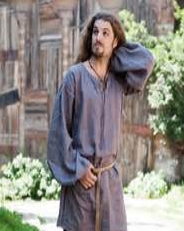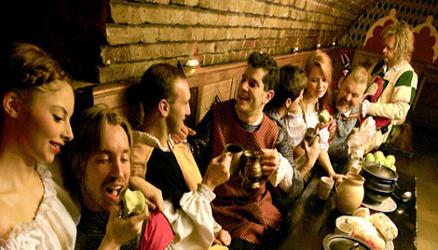We know nothing about what Will Langland looked like beyond what is found in the text. Early on, he writes of a person appearing before a king, and says "A long, lean crazy fellow knelt before the king and said..." The difference between translations can be interesting as each translator chooses words that will be true to the original but excite the audience of his time. The latest translation (Sutton) gives here;
"And suddenly a madman, a scrawny scarecrow,
Knelt to the king and quaintly declared...."
Some scholars think that this may be a self-description, since there are other references to Langland being tall and thin and he reveals himself as something of an oddball. He is thought to have been educated in the monastery at Great Malvern but never pursued a serious clerical career, being licensed only to performs minor rituals. But he reveals a wide knowledge of religious writings and extensive knowledge of the world he lived in, including politics. He scraped a living by performing simple religious rituals for wealthy men in exchange for board and lodging, and he excuses himself from manual work by arguing that he is too tall to bend his back. So he was a wanderer, devoting his whole life to writing his poem. He must have travelled widely, for there are references to many separate locations. It seems extraordinary that he should written so much over so long a period when he never speaks of having a stable base. Many beautiful manuscripts of his time were created in the cloistered peace of monasteries. How did Langland keep his manuscript dry when his life style was almost that of a vagrant? The picture here has been digitally bent to create the long/thin quality. His condemnation of practices he regards as wrong - and likely to land the doers in hell - might give the impression that he was a rather boring, saintly person. But such saintly people never indulge in the vigorous earthy language that is his hallmark. Further, there are references in the poem to a period spent in licentious living when he took no pleasure in doing good but devoted himself to drinking and dining and loving ladies. It is unknown whether this really happened or whether he is reflecting on what might have been and regretting that he had missed out. Nor is it known at what point in his life this happened (if it did). One hopes that the period is real, for numerous poets since have led colourful lives. He would be in good company. His life got more burdensome as he grew old. He complains once that;
"Weary and wet-shod I went forth."
One imagines him as receiving a poor welcome in some great house and having to move on without the hoped for respite. In a late section of the poem one of the allegorical characters he meets is Old Age who makes him bald, deaf and stiff and unable to satisfy his wife so that;
"She wished me dead."
These comments seems to coincide with increased directness in his writing, as if he had no time left for the elaborate diversions that are very common elsewhere. He certainly had a long life for those times for he writes of events that are historically dated.


